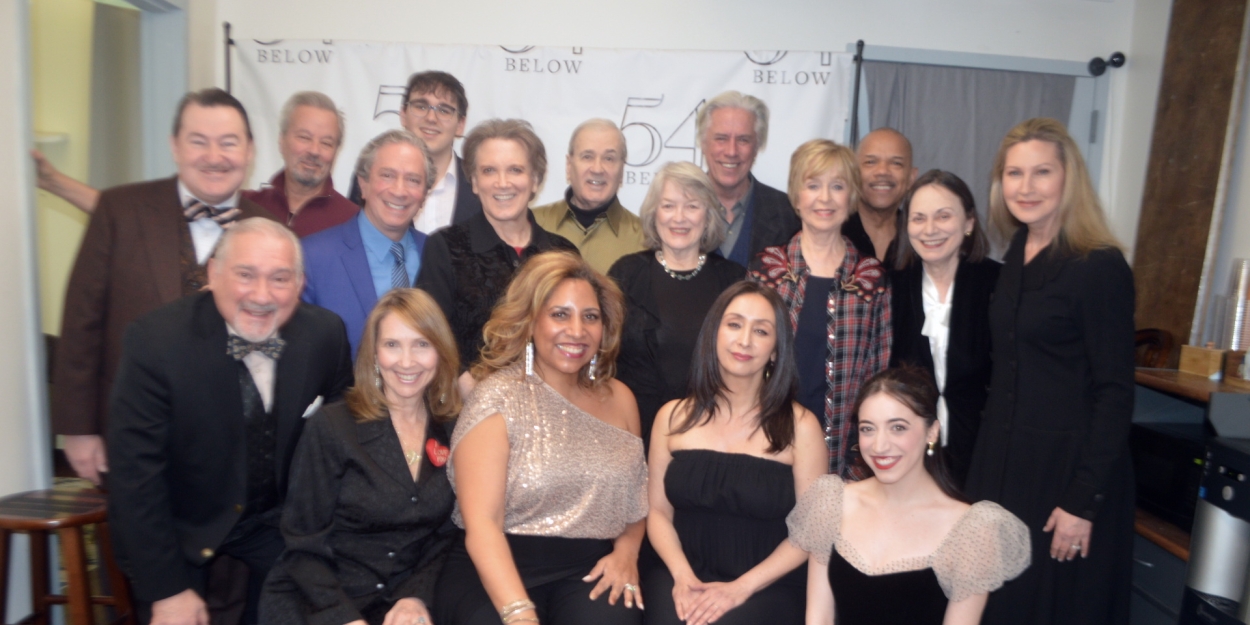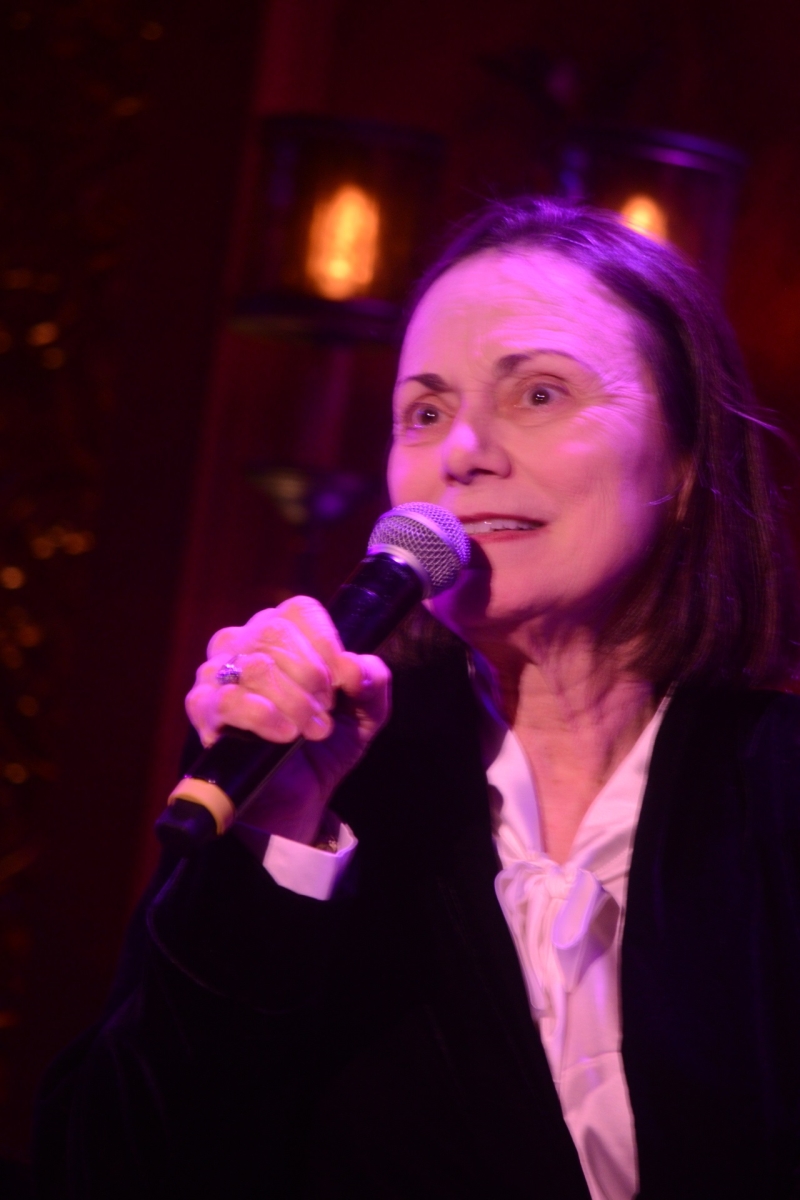Review: BACKSTAGE BABBLE Brought Flops Back to Life at 54 Below
The 2/19 show was inspired by Joe Allen Restaurant's “flop wall” of posters from shows that closed in the first week.

Charles Kirsch’s latest live edition of Backstage Babble on February 19, 2025 was a fun resurrection of songs from mostly flop shows that quickly failed on Broadway or out of town. The “Joe Allen” theme was inspired by the “flop wall” of posters seen on the walls at Joe Allen’s - all from shows that closed in their first week of business. (Coincidentally, when this reviewer wrote a handful of guest reviews here for Stephen Mosher, the last one was for Gerilyn Sohn’s If Joe Allen’s Walls Could Sing & Other Hidden Gems in 2022.) The venue was packed for this event, with many notable performers present in the audience.
The (still) impossibly young and tall Kirsch is the amiable emcee for his shows. His wealth of knowledge and depth of understanding of all things Broadway is breathtaking. Kirsch has interviewed over 200 stage notables, including the likes of Carol Burnett, Kelli O'Hara, Harvey Fierstein, Joel Grey, and Chita Rivera on his popular “Backstage Babble” podcast. Those episodes and his 54 Below shows of the same name have attracted high-profile performers to appear in this series, and this edition was a doozy. A number of the evening’s stars were original (and generally last-ever) cast members of the flops represented.
All performers were accompanied by the excellent musical director and pianist Michael Lavine.
For each show discussed, an original poster was shown on the 54 Below screens on either side of the stage.
Kirsch kicked off the evening with the delightful Jenna Lea Rosen, a petite performer with a big voice, to perform “Dear Miss Streisand” from the 1973 Rachael Lily Rosenbloom (And Don’t You Ever Forget It), (music and lyrics by Paul Jabara), a kind of Jewish girl-crush version of Judy Garland singing “Please Mister Gable?,” a love letter to Clark Gable, as the verse to “You Made Me Love You” in Broadway Melody of 1938.
Jerry Dixon was an original cast member of the off-Broadway Bright Lights, Big City, an adaptation of the Jay McInerney novel (music and lyrics by Paul Scott Goodman). He resuscitated “Wednesday,” a fun number he did not do in the show. He was “really pissed” when he heard it, and hammed it up at 54 Below. The show, had a second life and has been performed in many cities over the years.
Broadway veteran Cass Morgan gave a very poignant setup for “Long Past Sunset” from The Human Comedy (music by Galt MacDermot). The song tells of the tragic news, delivered by telegram, of a soldier’s death. Morgan’s rendition was lovely and touching.
Philip Casnoff made a very funny, Elvis-y entrance to perform a very funny medley from the disastrous Rockabye Hamlet (music and lyrics by Cliff Jones), a show that lasted only seven performances. He told a marvelous anecdote about director Gower Champion. Casnoff is a dynamic performer with great humor, whose vocal timbre is reminiscent of David Bowie’s.

Alma Cuervo reprised “Nothing Really Happened” from Is There Life After High School? (music and lyrics by Craig Carnelia). The director suggested that this somewhat Sondheimian song should be “sung by an older woman in a cabaret,” and at last, it was.
There is no better or funnier storyteller on the cabaret scene than Broadway veteran Lee Roy Reams, who stole the show as a last-minute substitute for Len Cariou. Reams was in excellent voice on a pair of songs from Lorelei (music by Jule Styne, lyrics by Betty Comden and Adolph Green). “Let’s get one thing straight - I can’t believe I just said that!”, he exclaimed, before explaining that Lorelei was not truly a flop, but star Carole Channing’s husband had already booked her, expecting a short run. Reams gave a great impression of Jule Styne to set up “I Won't Let You Get Away.” Styne told him, “I’m gonna give you the song I wrote for Fred Astaire!,” and Reams’ deadpan delivery of “This is the song” was perfect.” He cracked up the room with wonderful quotes from costar Dodie Goodman.
For Paul Simon’s show The Capeman (music by Paul Simon, lyrics by Paul Simon and Derek Walcott), Kirsch brought in original stars Natascia Diaz and Luba Mason. Diaz performed “Chimes” with passionate, powerful singing and acting that made herself emotional.
The Capeman changed Mason’s life. She was in a rocky marriage to her first husband when she got the offer to audition, did not want to do it. Her husband insisted. “It’s Paul Simon! And my favorite actor, Rubén Blades, is in it!” Mason announced that she has been married to Blades for 20 years. Mason, wearing the costume she wore in the show, performed “Can I Forgive Him” with Diaz. These two performers brought the audience right into the story. Their setup helped by their powerful delivery, was tear-inducing, and compelling theater.
Stuart Zagnit and Allen Lewis Rickman were quite funny with the vaudeville-like “Gold and Goldberg” from The Wild Party (music and lyrics by Michael John LaChiusa) and the fabulous “Remember Who You Are” from The People in the Picture (music by Artie Butler, lyrics by Iris Rainier Dart).
Readers may recall Jill Eikenberry from the television show “L.A. Law,” but in another life, she is well known as a Broadway performer. She sang, appropriately, “Another Life” from Onward Victoria (music by Keith Herrmann, lyrics by Charlotte Anker and Irene Rosenberg). It was interesting to learn that the premise centered on the first female presidential candidate, way back in 1873.
The tall and handsome Jeff McCarthy performed “Private Conversation” from Side Show (music by Henry Krieger, lyrics by Bill Russell). McCarthey has a big baritone voice and a strong presence. (McCarthy has a very “younger Joe Biden” quality about him. I suggested to him after the show that he should consider doing a Biden one-man show and call it “All That Malarkey.” He liked the idea.)
Ivy Austin was superb with “Rag Dolly” from Raggedy Ann (music and lyrics by Joe Raposo), which required her to affect a little-girl voice, and made great use of her father’s old boater hat. She sang part of the song in Russian, which she learned phonetically, as the show’s “out of town tryout” was in Russia!
Actor Charles Busch is well-known as a drag queen performer, and nearly as well-known as a librettist. Busch performed “Don’t Like Goodbyes” from a 1991 adaptation of House of Flowers (music by Harold Arlen, lyrics by Truman Capote and Harold Arlen) that starred R&B singer Patti LaBelle. Busch’s story about LaBelle mashing up “A Sleepin' Bee” with “Over the Rainbow” was quite funny. Director Geoffrey Holder declared, “You have witnessed theatrical history!” Though this song may be one of the most well-known number from the show (thanks to a young Barbra Streisand), “Don’t Like Goodbyes” has the only Truman Capote lyric recorded by Frank Sinatra. Busch’s stirring rendition of the tune was memorable and touching.
The show closed with a medley from Her First Roman, performed by Danielle Chambers (music and lyrics by Ervin M. Drake). The only (brief) run of the show starred Chambers’ mother, Leslie Uggams, who was in audience to cheer her daughter on. Chambers is a fine performer, and calling out her mom from the stage was a marvelous touch.
This edition of Backstage Babble was a delicious romp through a largely forgotten swatch of failed shows with memorable songs that deserve a second listen.
Learn more about Charles Kirsch and Backstage Babble podcast at www.charles-kirsch.com.
For more great shows at 54 Below, visit www.54below.org
All photos by Maryann Lopinto
Reader Reviews
Videos

